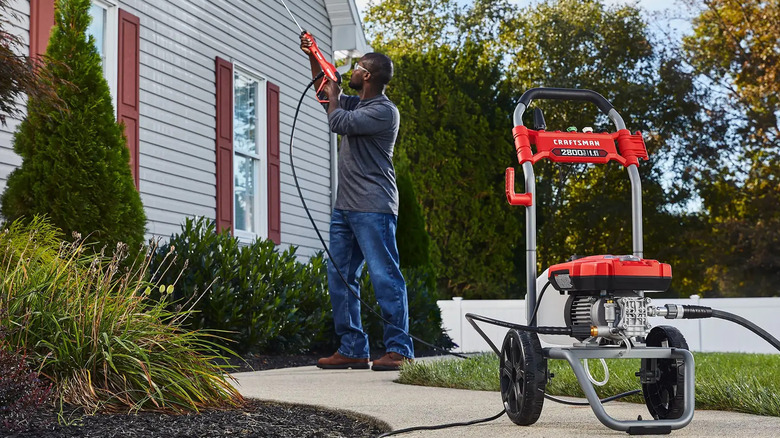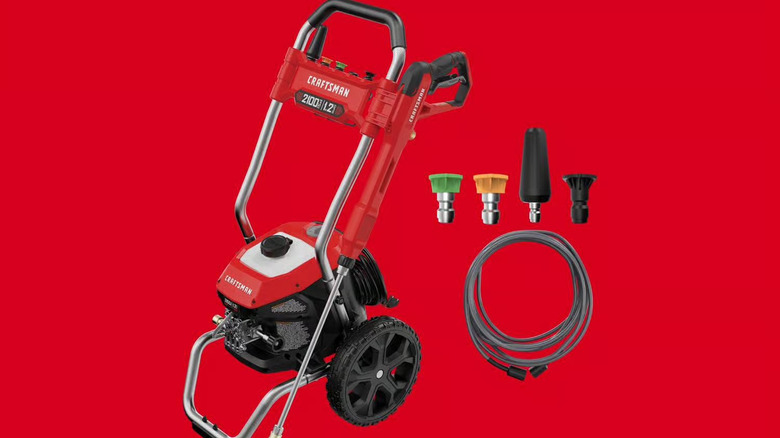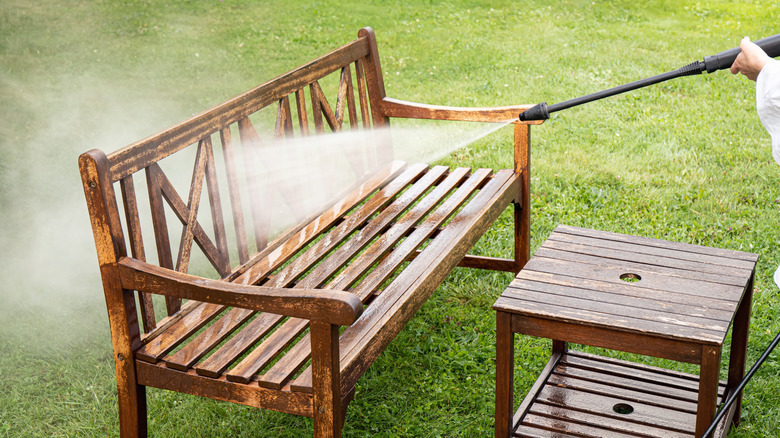Everything You Need To Know About Craftsman Pressure Washers Before You Buy
We may receive a commission on purchases made from links.
The Craftsman brand is almost 100 years old and is a popular and trusted line of tools and lawn and garden equipment. They're known for their quality, durability, and long warranties. Despite the fact that they're no longer made in the U.S., Craftsman remains a popular brand for many consumers.
You may already have a Craftsman tool set or lawn mower in your garage, but what about a pressure washer? Pressure washers are a great tool for making your sidewalks look like new again or cleaning mildew from the side of your home. They use electric or gas motors to run a pump that pressurizes water, usually from a household hose, and then forces it through a nozzle. This pressurized water easily cleans the toughest jobs, like graffiti from concrete and rust from metal surfaces.
You can buy or rent a pressure washer from most home improvement stores, and Craftsman's retail partners include both Lowe's and Ace. To pick the best one for your project, you'll want to consider how it's powered, the maximum PSI, its GPM (gallons per minute) rating, and what type of nozzle you should use. You'll also want to look at the warranty — does it include that Craftsman lifetime promise?
How tough is your job?
Before you invest any money or time, you'll want to learn a few basics. Be sure to research if the surface you want to clean is suitable for pressure washing. High-pressure water can cause damage if used improperly, and you'll need to be especially careful if you want to wash your car or clean your home's windows. You will also need detergent made especially for pressure washers, and potentially an extension cord and a place to plug in, depending on whether your washer is cordless or not.
Some of the Craftsman pressure washers come with interchangeable nozzles that allow you to pick the right spray pattern for your job. The 0-degree nozzle is reserved for the toughest jobs and provides the most concentrated spray pattern. The 15-degree nozzle will work great on your sidewalks, while the 25-degree nozzle should be used for cleaning your siding or your car. The 40-degree nozzle has the widest spray pattern, and Craftsman recommends using it to apply the soap, though it does also provide a soap nozzle specifically for this purpose. Finally, the turbo nozzle has a rotating spray that should be reserved for hard surfaces like brick.
Other considerations
There are two main types of pressure washers: electric and gas. Electric models tend to be more portable, lightweight and budget-friendly. Gas pressure washers are sometimes more powerful and can be a better choice for large jobs.
Craftsman also offers both corded and cordless pressure washers. Some are smaller, handheld power cleaners, while others are on wheels for easy maneuverability. If you're interested in cordless over corded, compare the washer's battery run time to the expected duration of your project – will it last, or will you have to pause for recharging?
When it comes to PSI, or pounds per square inch, and GPM, or gallons per minute, ratings matter. GPM measures the flow rate, or how much water the washer is using every minute. It determines the rinsing power of your pressure washer, while PSI determines the force of the water stream. If you only want to clean your patio furniture or your car, you can consider light-duty pressure washers with a PSI under 2,000. For moderate jobs like sidewalks and fences, look at washers with a PSI up to 2,800. Tough jobs like stripping paint may require even more power.
Finally, consider your budget. Craftsman pressure washers are about $200 to $400, depending on what type you select. Most come with a limited three-year warranty.


